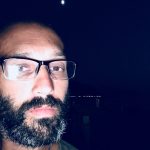The End of Stationarity: a review of Madeleine Watts’s The Inland Sea by Miki Lentin
My mother recounts a story from a recent holiday in Sydney, Australia. The apartment she was staying in had emptied of family, and she was alone for a few hours. With little to do, she decided to venture into the centre of town, maybe catch an exhibition or have lunch. The air seemed clear that morning, the forecast calm, despite the summer fires. Leaving the air conditioning of the modern block behind, she was met with sauna-like air, thick, syrupy. The wind was picking up, but she decided to continue towards the train station. It will pass, she thought. But the further she walked, the more her lungs tightened, the more her legs weakened, the more the sweat stuck to her forehead like a piece of gaffer tape. She stopped and looked up. The sky had turned red, blistering, angry. An asthmatic, she panicked, but managed to rest in a nearby air-conditioned café, caught her breath and returned home. She’d been outside for ten minutes.
I thought about my mother’s experience as I read Madeleine Watt’s debut novel, The Inland Sea, and the countless other stories we now all have of climate change. What until recently seemed so distant, untouchable, unidentifiable, is rapidly becoming personal, to us all. There wasn’t a day last winter when I didn’t see posts on Facebook with photos from my family of red skies at night covering Sydney, news reports of rural communities standing in the sea to protect their lives and animals, and tweets from a friend in Canberra on how the air was, for a brief time, the most polluted on the planet.
Watts calls this relentless unforgiving heat that swamped Australia, the ‘end of stationarity’. It’s an interesting phrase. According to the scientists, stationarity means that the statistical properties of a process generating a time series, do not change over time (https://www.kdnuggets.com/2019/08/stationarity-time-series-data.html). But the scientific data, together with the uneven and scary results of climate change, are now generating properties that are dangerously impacting our lives in ways that are now very much within touching distance.
The word ‘stationarity’ stuck with me as I continued to read The Inland Sea. A short book of 256 pages it traces the last few months of the narrator’s life in Sydney before she departs for ‘a warm, sunny climate far away from this one, a place that had nothing to do with me, and where there would be no history or memory tethering me to the land.’
‘In a word, I was drifting,’ is how the narrator describes herself early in the book. Having just finished university and in debt, she is employed working as an operator in a call-centre dispatching emergency services to places across Australia in the midst of the fire season. Meanwhile, we discover that the narrator’s great, great, great grandfather was the British explorer, John Oxley who in the early nineteenth century travelled to the central Australian outback in search of water. His search was fruitless, but throughout his life he continued to believe that an inland sea existed. The myth never died, and the search to find the sea was taken up by other explorers, many of whom died searching for the sea that was never there.
As the country burns, the young narrator’s life unravels. She drinks heavily, sleeps with strangers, wanders Sydney’s aggressive streets late at night, and has an affair with an ex-boyfriend who is obsessed by the Australian writer Patrick White. Under the shroud of having to send out emergency services to nameless voices in places she’d never heard of, her anxiety levels tip the scales. She becomes ‘afraid of just about everything’, and ‘couldn’t help but take everything personally’ and tells the reader that ‘I thought being hurt would give my life an interesting kind of texture, the way good surfers are always marked by the scrapes and scars of battles fought with the waves. I believed it would give me something to write about.’ As she dispatches the emergency services to save others, it seems that no one was coming to save her, so she finds solace in her ex, friends she doesn’t connect to, and the raw physicality of sex.
Written in the first person, Watts’ prose is sparse and economical, and it’s difficult to not get drawn into the writing, which is often claustrophobic, tight and fiercely visceral. There were moments when I felt as if I was walking the hostile streets of Sydney alongside the narrator, watching the sky burn, and following news reports come into the call-centre, callers screaming for help from fires and floods and social violence enveloping and destroying communities. People who previously were more interested in ‘footy and lunch’ than the effects of climate change, were now begging for help from an anxious-ridden young person in a call centre.
Watts cleverly weaves together the story of her long-lost relative John Oxley and the narrator’s own search for the unknown in a present-day world that is dying around her. The parallels are good, but there were times when reading The Inland Sea that I wanted the two stories to be more blended. When recalling Oxley’s story or describing weather systems, I found that the tone shifted to one of a history or science lesson, almost as if the narrator had to fall back into scientific language to understand the phenomena of loss or disconnection that she was herself experiencing.
As I finished reading The Inland Sea, I asked myself if this was a coming of age novel or a novel that looks at the environmental legacy we have left on the planet? I’m not sure it’s either, but perhaps it’s more of an attempt to warn us of the unnoticed and unintended physical and mental impact living in the midst of a climate crisis can have on our lives – the end of stationarity.
The Inland Sea, by Madeleine Watts is published by Pushkin Press.

